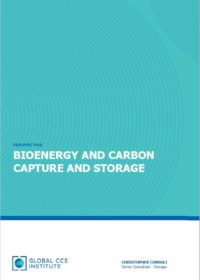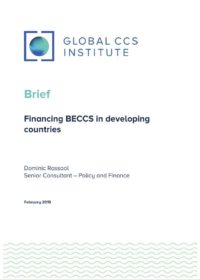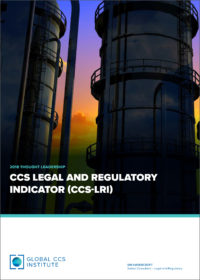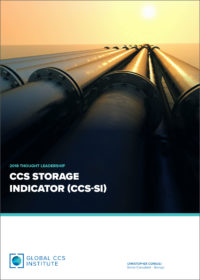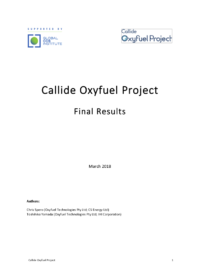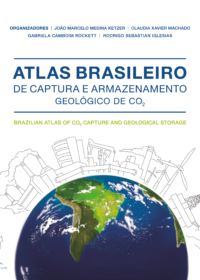Resources
Publications
Our publications, reports and research library hosts over 500 specialist reports and research papers on all topics associated with CCS.
View our Publication Library Disclaimer.
Filter by
Bioenergy and Carbon Capture and Storage
14th March 2019
Organisation(s): Global CCS Institute
Topic(s): Bioenergy with carbon capture and storage (BECCS), Biofuels / Bioenergy, Negative emissions technologies
After almost thirty years of climate change negotiations, global CO2 levels are still rising (NOAA, 2018). The UNFCCC Paris Agreement goals of holding global warming to ‘well-below’ 2°C and to ‘pursue efforts’ to limit it to 1.5°C are in stark contrast to the ever-dwindling carbon budget.
The evidence makes it clear. CO2 needs to be removed from the atmosphere, known as carbon dioxide removal (CDR), using negative emissions technologies (NETs) to meet global warming targets. Bioenergy with carbon capture and storage (BECCS) is emerging as the best solution to decarbonise emission-intensive industries and sectors and enable negative emissions.
This Perspective from Christopher Consoli, Senior Consultant - Storage, explores this technology and its deployment as a climate mitigation solution.
Financing BECCS in developing countries
11th February 2019
Organisation(s): Global CCS Institute
Topic(s): Bioenergy with carbon capture and storage (BECCS), Bioethanol, Project financing
Bioenergy with carbon capture and storage (BECCS) is a promising class of technologies for carbon dioxide (CO2) removal and consists of the capture and permanent geological storage of CO2 stemming from biomass transformation or combustion. Several industrial sectors can implement this technology, including the biofuel sector which is predominantly made up of bioethanol production. Bioethanol is one of the few renewable alternatives to oil and gas-based liquid fuel, with which it can be easily blended to be used as a transportation fuel.
As countries seek to decarbonise transport, demand for bioethanol is set to grow globally. By integrating CCS into the production process for bioethanol, negative emissions can be created. It is forecast that a significant proportion of the world’s bioethanol production will come from developing countries (International Energy Agency, 2018).
This brief focuses on how the production of bioethanol with CCS can be supported by climate finance providers, and the pivotal role Brazil can play in facilitating this process.
Global Status of CCS Report: 2018
10th December 2018
Organisation(s): Global CCS Institute
Topic(s): Carbon capture and storage (CCS), CCS policy, CO2 hubs, CO2 storage, CO2 transport
The Global Status of CCS Report 2018 documents the status of CCS around the world and significant operational milestones over the past 12 months. It demystifies common misunderstandings about the technology and identifies where and how it can, and must, be more widely deployed. It also tracks the worldwide progress of CCS technologies and the key opportunities and challenges CCS faces.
Disclaimer
The content within the Global CCS Institute Publications, Reports and Research Library is provided for information purposes only. We make every effort and take reasonable care to keep the content of this section up-to-date and error-free. However, we make no claim as to its accuracy, currency or reliability.
Content and material featured within this section of our website includes reports and research published by third parties. The content and material may include opinions and recommendations of third parties that do not reflect those held by the Global CCS Institute.
The paper/publication is courtesy of Dr S Julio Friedmann.
Disclaimer
The content within the Global CCS Institute Publications, Reports and Research Library is provided for information purposes only. We make every effort and take reasonable care to keep the content of this section up-to-date and error-free. However, we make no claim as to its accuracy, currency or reliability.
Content and material featured within this section of our website includes reports and research published by third parties. The content and material may include opinions and recommendations of third parties that do not reflect those held by the Global CCS Institute.
The Carbon Capture and Storage Readiness Index 2018: Is the world ready for carbon capture and storage?
16th October 2018
Topic(s): Carbon capture use and storage (CCUS), Economics, Policy law and regulation
Collectively, our three Indicator Reports 2018 form a further, criteria-based assessment known as the CCS Readiness Index, or CCS-RI. The 2018 CCS-RI examines over 50 countries using 70 discrete criteria and enables a comparative assessment of countries globally.
Clear from the 2018 assessment is that greater effort is required to deploy CCS at the scale necessary to meet climate change mitigation ambitions.
Disclaimer
The content within the Global CCS Institute Publications, Reports and Research Library is provided for information purposes only. We make every effort and take reasonable care to keep the content of this section up-to-date and error-free. However, we make no claim as to its accuracy, currency or reliability.
Content and material featured within this section of our website includes reports and research published by third parties. The content and material may include opinions and recommendations of third parties that do not reflect those held by the Global CCS Institute.
CCS Policy Indicator (CCS-PI)
16th October 2018
Organisation(s): Global CCS Institute
Topic(s): Carbon capture use and storage (CCUS), Economics, Policy law and regulation, Project financing
Government policy, given effect through law and the allocation of public resources, is critical to achieving climate targets. It plays a material role in determining the return on investment for any climate mitigation technology making confidence in government policy a pre-requisite of investment.
The CCS-PI tracks the development of government policy to accelerate the deployment of CCS as an essential climate mitigation technology in over 100 countries.
Disclaimer
The content within the Global CCS Institute Publications, Reports and Research Library is provided for information purposes only. We make every effort and take reasonable care to keep the content of this section up-to-date and error-free. However, we make no claim as to its accuracy, currency or reliability.
Content and material featured within this section of our website includes reports and research published by third parties. The content and material may include opinions and recommendations of third parties that do not reflect those held by the Global CCS Institute.
Legal & Regulatory Indicator (CCS-LRI)
16th October 2018
Topic(s): Carbon capture use and storage (CCUS), Policy law and regulation
Law and regulation remains a critical element of a government’s policy response to support the development and deployment of CCS. Robust legal and regulatory frameworks provide certainty for businesses eager to engage in innovation, and the deployment of CCS.
The CCS-LRI offers a detailed examination and assessment of national legal and regulatory frameworks in 55 countries and examines a range of legal and regulatory factors likely to be critical for the regulation of the technology.
Disclaimer
The content within the Global CCS Institute Publications, Reports and Research Library is provided for information purposes only. We make every effort and take reasonable care to keep the content of this section up-to-date and error-free. However, we make no claim as to its accuracy, currency or reliability.
Content and material featured within this section of our website includes reports and research published by third parties. The content and material may include opinions and recommendations of third parties that do not reflect those held by the Global CCS Institute.
CCS Storage Indicator (CCS-SI)
16th October 2018
Topic(s): Capacity development, Carbon capture use and storage (CCUS), Policy law and regulation
The availability of storage resources is the ultimate pre-requisite for CCS deployment. For global CCS deployment, each country needs to know where, and how much, CO2 can be stored. Each nation needs to characterise, explore and appraise a national portfolio of accessible, commercially-viable storage sites ready for CCS Facilities.
The CCS-SI tracks the development of storage resources for 80 countries. The 2018 scores confirm an overall improvement since the 2015 CCS-SI with twelve nations having mature, or near-mature, storage resources to enable wide-scale CCS.
Disclaimer
The content within the Global CCS Institute Publications, Reports and Research Library is provided for information purposes only. We make every effort and take reasonable care to keep the content of this section up-to-date and error-free. However, we make no claim as to its accuracy, currency or reliability.
Content and material featured within this section of our website includes reports and research published by third parties. The content and material may include opinions and recommendations of third parties that do not reflect those held by the Global CCS Institute.
The Callide Oxyfuel project was undertaken in three parts:
- Stage 1 – Demonstration of oxyfuel CO2 capture;
- Stage 2 – assessment of CO2 storage options and potential in Queensland and CO2 injection testing; and
- Stage 3 – Project wrap up and commercialisation.
The work and outcomes of these three phases are summarised in this report.
Disclaimer
The content within the Global CCS Institute Publications, Reports and Research Library is provided for information purposes only. We make every effort and take reasonable care to keep the content of this section up-to-date and error-free. However, we make no claim as to its accuracy, currency or reliability.
Content and material featured within this section of our website includes reports and research published by third parties. The content and material may include opinions and recommendations of third parties that do not reflect those held by the Global CCS Institute.
The Brazilian Atlas of CO2 Capture and Geological Storage presents the main CO2 sources in the country in relation to their type and annual emission. The Atlas also presents the existing pipeline infrastructure and rank possible areas (basins) for geological storage in terms of their prospectivity. Legal issues are also discussed in addition to the basic principles of the technology. The Atlas represents an important step in the development of CCS in Brazil and the dissemination of knowledge of these technologies, contributing to actions leading to mitigation of climate change. It can be used as a reference for CCS in Brazil, but also as a general textbook on CCS technologies.
Disclaimer
The content within the Global CCS Institute Publications, Reports and Research Library is provided for information purposes only. We make every effort and take reasonable care to keep the content of this section up-to-date and error-free. However, we make no claim as to its accuracy, currency or reliability.
Content and material featured within this section of our website includes reports and research published by third parties. The content and material may include opinions and recommendations of third parties that do not reflect those held by the Global CCS Institute.
Principles for Best Practice Geomechanics for CCS Injection Operations and its Application to the CarbonNet Project
27th October 2017
CarbonNet is investigating the potential for establishing a commercial scale CCS network, bringing together multiple CO2 capture projects in Victoria’s Latrobe Valley, transporting the CO2 via pipeline and injecting it deep into nearshore underground storage sites in the Gippsland region. It plans an initial capacity to capture, transport and store in the range of 1-5 Mtpa of CO2 during the 2020s.
The latest report, titled “Principles for Best Practice Geomechanics for CCS Injection Operations and its Application to the CarbonNet Project”, found the basin in which the CarbonNet Project site is targeting has the ideal geological conditions for storage. A CarbonNet Project study shows that their storage site would not be prone to seismicity and that the selected site is suitable for the permanent storage of CO2.
Disclaimer
The content within the Global CCS Institute Publications, Reports and Research Library is provided for information purposes only. We make every effort and take reasonable care to keep the content of this section up-to-date and error-free. However, we make no claim as to its accuracy, currency or reliability.
Content and material featured within this section of our website includes reports and research published by third parties. The content and material may include opinions and recommendations of third parties that do not reflect those held by the Global CCS Institute.
Report led by researchers from University College London: "The role of CCS in meeting climate policy targets"
24th October 2017
The Global CCS Institute has commissioned an authoritative and independent report that examines policy issues in the deployment of CCS, in accordance with global commitments to limit temperature increases to below 2 and 1.5 degrees Celsius. It outlines comprehensively the arguments made for and against CCS deployment, examines the experience of CCS deployment to date in a range of countries, draws lessons from other analogous technologies, and explores findings from integrated energy systems modelling.
The report is intended to inform a wide variety of stakeholders on the relative importance of the full set of policy instruments available to promote CCS and emission reduction technologies more generally.
The report was led by authors Dr Nick Hughes and Professor Paul Ekins at the UCL Institute for Sustainable Resources, as part of a consortium that drew in other world-leading expertise from the UCL Energy Institute, UCL Faculty of Laws, University of Edinburgh and the UK Energy Research Centre. The project team brought together extensive experience on CCS technology, legal and regulatory issues connected to CCS, low-carbon energy policy-making, energy systems analysis and the governance of energy technologies.
Disclaimer
The content within the Global CCS Institute Publications, Reports and Research Library is provided for information purposes only. We make every effort and take reasonable care to keep the content of this section up-to-date and error-free. However, we make no claim as to its accuracy, currency or reliability.
Content and material featured within this section of our website includes reports and research published by third parties. The content and material may include opinions and recommendations of third parties that do not reflect those held by the Global CCS Institute.
